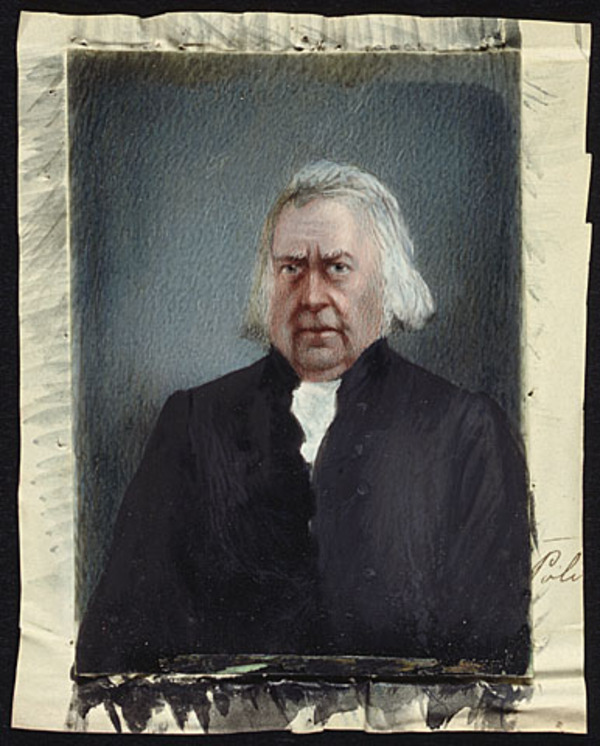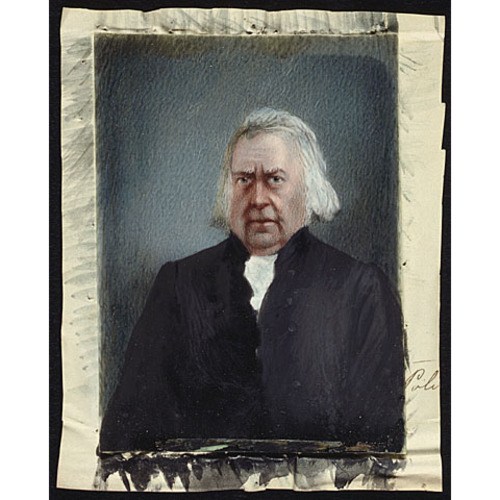FLETCHER, JOHN, lawyer, militia officer, judge, office holder, and jp; b. c. 1767 in Rochester, England; d. 11 Oct. 1844 in Sherbrooke, Lower Canada.
John Fletcher, whose father and grandfather were Church of England clergymen, attended St Paul’s School in London. Later he studied law and was called to the bar in that city. A brilliant lawyer, he rapidly acquired an excellent reputation in the profession. The scientific advances of the time were of keen interest to him. He gained further renown by giving public lectures that were always well received and by publishing articles in London’s major scientific journals. Given such success, it is not easy to discern what, other than a spirit of adventure, might have prompted him to come to Lower Canada in 1810. He took up residence at Quebec and was called to the bar on 4 December of that year.
In April 1814 Fletcher made an attempt to enter politics. He ran in Upper Town Quebec for election to the House of Assembly. But Jean-Antoine Panet* and Claude Dénéchau, who were both popular in the riding, proved formidable opponents, and Fletcher withdrew before the polling ended, having received only 12 votes.
On 16 May 1814, through government patronage, Fletcher was appointed coroner for the district of Quebec, and he retained this post until 24 Sept. 1815. On 6 May 1815 he was named commissioner to rebuild the court-house at Quebec, and on 22 November he became a magistrate of the Court of Quarter Sessions there. Fletcher took part in the War of 1812 as an ensign in the 6th Select Embodied Militia Battalion, and then in the 1st Militia Battalion of the town of Quebec. He was promoted captain in the latter unit on 11 May 1816.
The following October Fletcher and William Bacheler Coltman* were made justices of the peace for the Indian Territory in the northwest. A short time later they were sent to investigate the crimes brought about by the conflict between the two great fur trade rivals, the Hudson’s Bay Company and the North West Company. Fletcher went to Fort William (Thunder Bay, Ont.) with a small party of soldiers in the spring of 1817. He was to have continued on to the Red River but remained at the fort, and in the end it was Coltman who carried out their commission on his own.
Having returned to Quebec in 1818, Fletcher resumed the practice of law, and on 1 May 1823 he was appointed judge of the Provincial Court for the new district of Saint-François, with residence at Sherbrooke. An eccentric man, he rightly or wrongly became known as a judge who was often biased, high-handed, and arbitrary in his decisions. In fact, the House of Assembly received many complaints about him between 1828 and 1832. One of these contentious cases, the Dickerson affair, remains famous. In the years 1826–28 Silas Horton Dickerson*, publisher of the weekly British Colonist and St. Francis Gazette of Stanstead, printed several disparaging articles about the Provincial Court of Saint-François and Fletcher’s decisions. Consequently, on a number of occasions he was arrested on Fletcher’s orders for contempt of court and sentenced to heavy fines and even to jail. This matter, and others, were brought to the attention of the assembly in 1828. Fletcher was accused of having acted as both plaintiff and judge in certain cases and of having exceeded his judicial powers in imposing fines and prison sentences for contempt of court committed outside the courtroom, as judges of the higher provincial courts and in London could do.
A lengthy investigation ensued, without Fletcher being called to testify before the assembly, and in 1829 the house asked Governor Sir James Kempt* to remove him from office. This recommendation, like those made by commissions of inquiry in 1831, 1832, and 1836, was never acted upon. In the face of repeated requests from the house for his dismissal, Fletcher finally consented to explain his conduct in three long memoranda dated 13 Feb. 1832 and 20 April and 18 May 1836. In 1836, when called upon to make a decision in the case, the new governor, Lord Gosford [Acheson], asked for a legal opinion from the attorney general, Charles Richard Ogden*, and the solicitor general, Michael O’Sullivan, as to the extent of a provincial court judge’s powers in a case of contempt committed outside the court-room. Both decided that Fletcher was within his rights. As a final resort Lord Gosford decided, following his predecessor’s example, to refer the matter to the Privy Council in London, which never acted upon it. As a result John Fletcher was able to continue exercising his judicial functions until his death.
ANQ-E, CE1-41, 11 oct. 1844; E4/T/4. L.C., House of Assembly, Journals, 1828–29, app.MM; 1831, app.CC; 1831–32, app.W. Quebec Gazette, 7, 14, 21 April 1814; 16 Sept., 7 Nov. 1816; 14 Oct. 1844. F.-J. Audet, “Commissions d’avocats,” BRH, 39: 580; “Coroners de Québec (liste revisée),” BRH, 8 (1902): 147. H. J. Morgan, Sketches of celebrated Canadians. P.-G. Roy, Les avocats de la région de Québec; Les juges de la prov. de Québec. Wallace, Macmillan dict. Buchanan, Bench and bar of L.C. Maurice O’Bready, De Ktiné à Sherbrooke; esquisse historique de Sherbrooke: des origines à 1954 (Sherbrooke, Qué., 1973). F.-J. Audet, “Le juge Fletcher,” BRH, 2 (1896): 109. J.-P. Kesteman, “Les premiers journaux du district de Saint-François (1823–1845),” RHAF, 31 (1977–78): 239–53. “Tablette commémorative érigée dans l’église Saint-Pierre, à Sherbrooke,” BRH, 40 (1934): 124.
Cite This Article
Christine Veilleux, “FLETCHER, JOHN (d. 1844),” in Dictionary of Canadian Biography, vol. 7, University of Toronto/Université Laval, 2003–, accessed December 31, 2025, https://www.biographi.ca/en/bio/fletcher_john_1844_7E.html.
The citation above shows the format for footnotes and endnotes according to the Chicago manual of style (16th edition). Information to be used in other citation formats:
| Permalink: | https://www.biographi.ca/en/bio/fletcher_john_1844_7E.html |
| Author of Article: | Christine Veilleux |
| Title of Article: | FLETCHER, JOHN (d. 1844) |
| Publication Name: | Dictionary of Canadian Biography, vol. 7 |
| Publisher: | University of Toronto/Université Laval |
| Year of publication: | 1988 |
| Year of revision: | 1988 |
| Access Date: | December 31, 2025 |




